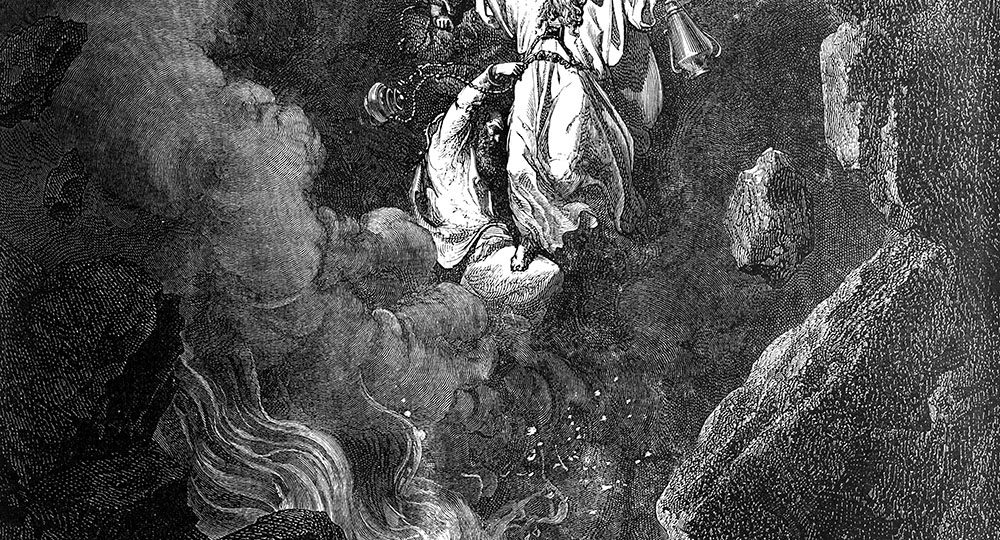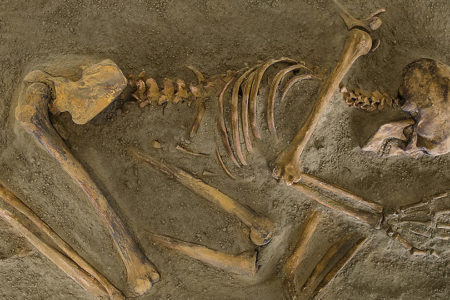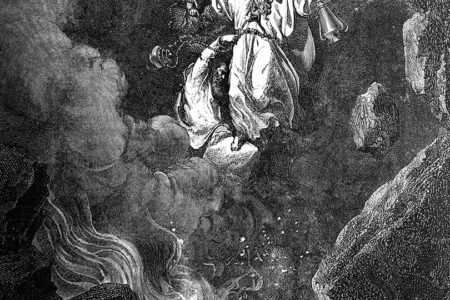Rebels Without a Cause
It didn’t go well for Korah and crew when they complained against God. In fact, the ended up in what people today might call a giant sinkhole.
JEWISH CULTURE & CUSTOMS
Expand your Yiddish vocabulary by reading Jewish Culture & Customs by Steve Herzig.
Anyone who knows a little Yiddish probably knows the word kvetch. It means to complain and whine habitually. The children of Israel did a lot of kvetching during their sojourn in the desert (cf. Ex. 14:10–14; 15:22–27; 17:1–7). In fact, Moses became so frustrated with the complaining that he asked the Lord to kill him (Num. 11:14–15).
Numbers 16 records the rebellion of the Levite Korah, a classic kvetcher, who complained against Moses’ leadership and thus complained against God.
Korah, whose name means “division” or “split,” conspired with two members of the tribe of Reuben and 250 respected members of Israel’s ruling council to rebel against Moses and Aaron (vv. 11–12). Feeling overlooked in priestly honors and leadership, he became jealous and whipped up discord among the Israelites. Proverbs 29:22 teaches, “An angry man stirs up strife, and a furious man abounds in transgression.” Korah did both.
First-century Jewish historian Flavius Josephus wrote,
Corah, a Hebrew of principal account, both by his family and by his wealth, one that was also able to speak well, and one that could easily persuade the people by his speeches, saw that Moses was in an exceeding great dignity [authority], and was uneasy at it, and envied him on that account (he was of the same tribe with Moses, and of kin to him), was particularly grieved, because he thought he better deserved that honorable post on account of his great riches, and not inferior to him in his birth.1
Korah and his men accused Moses and Aaron of arrogance and pride: “You take too much upon yourselves, for all the congregation is holy, every one of them, and the LORD is among them. Why then do you exalt yourselves above the assembly of the LORD?” (Num. 16:3). But in revolting against Moses and Aaron, they revolted against God because He sovereignly placed Moses as their leader and Aaron as their priest (Ex. 3:10; 28:1).
Their incitement against God’s order revealed their covetous, self-seeking hearts: “But if you have bitter envy and self-seeking in your hearts, do not boast and lie against the truth. This wisdom does not descend from above, but is earthly, sensual, demonic. For where envy and self-seeking exist, confusion and every evil thing are there” (Jas. 3:14–16).
Unfortunately, many people seek leadership not because they wish to serve others but, rather, because they derive their self-worth from their positions and want to bolster their egos. They seek preeminence out of selfishness and pride. Moses, by contrast, begged God to relieve him of the pressure of leadership.
When Moses heard Korah’s complaints, he instructed the troublemakers to present themselves at the door of the Tabernacle, each carrying a censer with incense to burn before the Lord:
Tomorrow morning the LORD will show who is His and who is holy, and will cause him to come near to Him. That one whom He chooses He will cause to come near to Him. Do this: Take censers, Korah and all your company; put fire in them and put incense in them before the LORD tomorrow, and it shall be that the man whom the LORD chooses is the holy one (Num. 16:5–7).
Korah’s self-righteous delusion is shocking. How could he and his followers not fear to face God in offering Him incense? The Lord took incense-burning seriously. They must have forgotten how God killed Aaron’s two sons who “offered profane fire before the LORD” (Lev. 10:1).
The ancient Jewish sages called Korah the arch-detractor of the Torah (Law). His action revealed his real intent: to modify God’s ordained form of worship. Such impudence led to his downfall. Proverbs 16:18 warns, “Pride goes before destruction, and a haughty spirit before a fall.”
When Korah, his men, Moses, and Aaron gathered at the entrance of the Tabernacle, Moses declared,
By this you shall know that the LORD has sent me to do all these works, for I have not done them of my own will. If these men die naturally like all men . . . then the LORD has not sent me. But if the LORD creates a new thing, and the earth opens its mouth and swallows them up with all that belongs to them, and they go down alive into the pit, then you will understand that these men have rejected the LORD (Num. 16:28–30).
Before Moses even finished speaking, the earth opened up and swallowed Korah, his followers, their families, and all their possessions. “The earth closed over them, and they perished from among the assembly” (v. 33). Then the fire of the Lord consumed the 250 men who were offering incense.
Nineteenth-century German philosopher Georg Wilhelm Friedrich Hegel wrote, “The one thing we learn from history is that we don’t learn from history.” As true followers of God’s Word, we should learn from Korah’s rebellion lest history repeat itself: “For whatever things were written before were written for our learning, that we through the patience and comfort of the Scriptures might have hope” (Rom. 15:4).
God vindicated Moses and Aaron and severely punished the rebels. The core issue of Korah’s rebellion was his refusal to submit to God’s authority. Proverbs 17:19 says, “He who loves transgression loves strife, and he who exalts his gate seeks destruction.” Korah and his followers loved transgression and sought destruction. Their incitement against God’s order illustrated their lack of holiness and their bitter hearts.
Korah’s dispute emanated from evil motives and a desire to destroy. Though controversies and disagreements will abound until Christ returns, we must try to handle them in a godly manner. Korah and his followers did not. They were selfish, envious, and evil; and they rebelled against God and the leaders He had appointed. We should fear God and do everything for His glory.
Endnote
- Flavius Josephus, Antiquities of the Jews 4.2.2.








